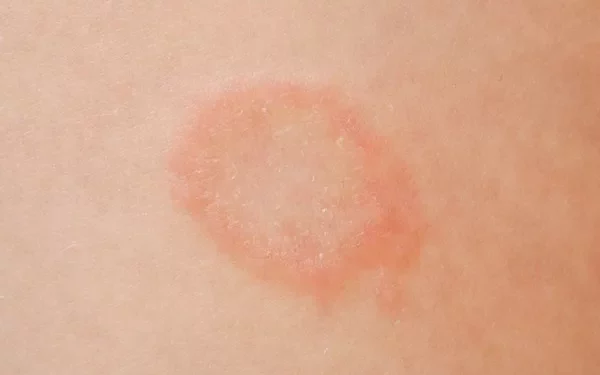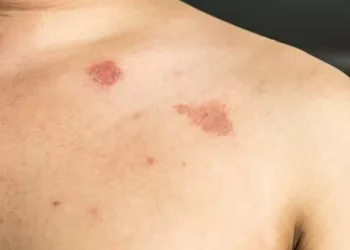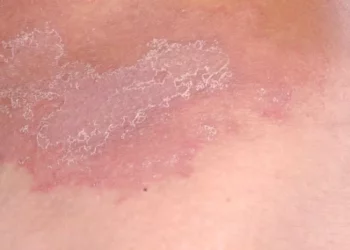Ringworm, despite its misleading name, is not a worm or a parasite but a fungal infection that affects the skin, hair, and nails. Scientifically referred to as dermatophytosis or tinea, ringworm is caused by various species of fungi, primarily Trichophyton, Microsporum, and Epidermophyton. This condition can manifest in different parts of the body, leading to distinct names based on the infection site, such as tinea capitis (scalp), tinea corporis (body), tinea pedis (feet, commonly known as athlete’s foot), and tinea cruris (groin, also known as jock itch). The term “chronic” refers to a condition that persists over a long period, either continuously or with recurring episodes. This article explores whether ringworm can be considered a chronic condition, examining its causes, symptoms, treatment, and prevention.
Understanding Ringworm
Ringworm is characterized by a red, itchy, circular rash with a clearer center, giving it a ring-like appearance. This fungal infection thrives in warm, moist environments, making skin folds, locker rooms, and communal showers common places for transmission. Ringworm is highly contagious, spreading through direct skin-to-skin contact, contact with contaminated objects (such as towels, clothing, or surfaces), and even from pets to humans.
Causes and Risk Factors
The primary cause of ringworm is dermatophyte fungi, which feed on keratin, a protein found in skin, hair, and nails. Factors that increase the risk of developing ringworm include:
- Warm, Humid Climates: Environments that are hot and humid provide ideal conditions for fungal growth.
- Close Contact: Living in close quarters with others, such as in dormitories or military barracks, increases the likelihood of transmission.
- Athletic Activities: Athletes, particularly those involved in contact sports, are at higher risk due to increased skin-to-skin contact and shared equipment.
- Weakened Immune System: Individuals with weakened immune systems, such as those with HIV/AIDS or undergoing chemotherapy, are more susceptible to infections.
- Poor Hygiene: Infrequent bathing and wearing tight or damp clothing can create an environment conducive to fungal growth.
Symptoms of Ringworm
The symptoms of ringworm vary depending on the location of the infection but commonly include:
- Itchy, Red, Circular Rash: The hallmark sign of ringworm is a red, circular rash with a clearer center.
- Scaling and Cracking: The affected skin may become scaly, cracked, or blistered.
- Hair Loss: Infections on the scalp can lead to hair loss and, in severe cases, kerion, a painful, inflamed mass.
- Thickened, Discolored Nails: Nail infections can cause nails to become thick, discolored, and brittle.
Diagnosis
Diagnosing ringworm typically involves a physical examination of the affected area. In some cases, a doctor may take skin scrapings or nail clippings to examine under a microscope or culture to identify the specific fungus responsible.
Treatment of Ringworm
Treatment for ringworm involves antifungal medications, which can be administered topically or orally, depending on the severity and location of the infection.
- Topical Antifungals: Over-the-counter antifungal creams, lotions, or powders, such as clotrimazole, miconazole, or terbinafine, are commonly used for mild cases of ringworm on the skin. These treatments are usually applied directly to the affected area for two to four weeks.
- Oral Antifungals: More severe or widespread infections, especially those affecting the scalp or nails, may require prescription oral antifungal medications, such as terbinafine, itraconazole, or fluconazole. Treatment duration can range from several weeks to several months, depending on the location and severity of the infection.
- Home Remedies: In conjunction with antifungal medications, maintaining good hygiene, keeping the affected area clean and dry, and avoiding sharing personal items can help speed up recovery and prevent the spread of infection.
SEE ALSO: How Dangerous Is Ringworm?
Is Ringworm Chronic?
While ringworm is generally considered an acute infection, it can become chronic under certain circumstances. Chronic ringworm refers to infections that persist for an extended period or recur frequently. Several factors can contribute to chronic ringworm:
- Inadequate Treatment: Insufficient or improper treatment can lead to persistent or recurrent infections. It is crucial to complete the full course of antifungal medication, even if symptoms improve, to ensure the infection is fully eradicated.
- Reinfection: Continuous exposure to sources of infection, such as contaminated environments or untreated pets, can result in recurrent episodes of ringworm.
- Underlying Health Conditions: Individuals with weakened immune systems or chronic health conditions, such as diabetes, may be more prone to chronic infections.
- Resistant Fungal Strains: Some fungal strains may develop resistance to antifungal medications, making treatment more challenging and leading to persistent infections.
Preventing Chronic Ringworm
Preventing chronic ringworm involves a combination of personal hygiene practices and environmental measures:
- Good Hygiene: Regular bathing, thoroughly drying the skin, and wearing clean, dry clothing can help prevent fungal infections.
- Avoid Sharing Personal Items: Do not share towels, clothing, or personal grooming items with others.
- Clean and Disinfect: Regularly clean and disinfect surfaces, clothing, and equipment, especially in communal areas such as gyms and locker rooms.
- Pet Care: Ensure pets are free from ringworm and seek veterinary treatment if necessary.
- Boost Immune Health: Maintain a healthy lifestyle to support a robust immune system, including a balanced diet, regular exercise, and adequate sleep.
Conclusion
Ringworm, though typically an acute infection, can become chronic under certain conditions. Understanding the causes, symptoms, and treatment options is essential for effectively managing and preventing this common fungal infection. By adhering to good hygiene practices and seeking appropriate medical treatment, individuals can reduce the risk of chronic ringworm and enjoy healthier skin. If you suspect a ringworm infection, consult a healthcare professional for accurate diagnosis and effective treatment.
Related Topics:
























